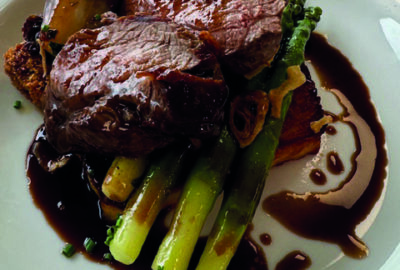Plant-based private chef and certified nutrition coach, Lisa Marley has a wealth of experience under her belt. Having trained at Ashburton Cookery School in Devon and as pastry chef in London, Lisa spent time delivering face to face plant-based cooking training to local authorities and MAT caterers before branching out. This month she will be representing England in a new TV series of The World Cook, on Amazon Prime.
When did your passion for cooking start?
My love for food started young, although my initial connection was more about eating than cooking. However, it was only later in life, after a decade-long career as a TV presenter, that I decided to channel my passion for food into a more hands-on pursuit. I found comfort and creativity in baking at home. What started as a therapeutic outlet soon blossomed into a passion, leading me to train as a pastry chef at Westminster Kingsway College. I set up a company with my husband, Nathan, called The Cocoa Box, dedicated to teaching chocolate-making workshops and cake decorating classes. We were Lastminute.com’s biggest seller. We closed the company after 10 years, just before the lockdown. By that time, I was fully plant-based.
How have you honed your skills over the years?
My culinary skills have evolved through a combination of formal training, hands-on experience, and a genuine passion for the art of cooking. My formal training provided me with a solid foundation in techniques, flavour profiles, and kitchen management. I studied culinary skills at Ashburton Cookery School. I regularly attend workshops and courses. I love learning.

Have you always focused on plant-based dishes?
Despite my relatively recent transition to a plant-based lifestyle just six years ago, it has proven to be the single most transformative decision for my well-being, the environment, and the welfare of animals. Embracing a plant-based diet has not only elevated my personal health but has also aligned my values with sustainable living and ethical choices.
What excites you about your job?
It is the diverse elements that it encompasses. The prospect of travel introduces me to new culinary landscapes, allowing me to explore and integrate regional flavours into my plant-based repertoire. Television work adds an exciting dimension, providing a platform to share my passion and culinary expertise with a broader audience. Cooking for people brings an immediate sense of gratification, as I see the joy and satisfaction that plant-based dishes can bring too.
What lessons have you learned?
One of the most significant lessons I’ve learned throughout my culinary journey is the understanding that learning is a lifelong process. The world of food is ever-evolving, with new techniques, ingredients, and trends constantly emerging.
Moreover, I’ve come to recognise that food is inherently emotive and can be a divisive topic. People often have deep-rooted connections to their culinary traditions and dietary choices, making it essential to approach discussions with respect and an open mind. In navigating this, I try to avoid judgement and preachiness, recognising the personal nature of people’s relationships with food.
As a champion of reducing waste in the kitchen – what activities do you now implement instinctively that other chefs should adopt?
I instinctively incorporate practices such as utilising food scraps for soups, stocks and composting, mindful portion control to minimise leftovers, and creative repurposing of ingredients to limit waste. I encourage fellow chefs to adopt these habits, fostering sustainability without compromising culinary excellence.
What tips do you have for chefs who want to achieve a carbon neutral kitchen?
Where possible, use local and seasonal ingredients to reduce the carbon footprint associated with transportation. Supporting local farmers and producers not only lowers emissions but also promotes community sustainability.
Implement rigorous waste reduction practices by composting organic waste. Scrutinise kitchen processes to minimise food waste and consider repurposing or donating excess food to further reduce environmental impact.
Replace single-use items with reusable alternatives, such as cloth napkins, glassware, and stainless steel straws. Embrace sustainable packaging and consider offering incentives for customers who bring their reusable containers.

Having worked within the education sector, what are the biggest challenges facing education catering?
In the UK, the education sector grapples with multifaceted challenges, including the soaring cost of living, budget constraints, and persistent misconceptions about plant-based food. Escalating living expenses make education less accessible, exacerbating socio-economic disparities. Budget restraints impede schools’ ability to innovate and provide quality resources. Moreover, misconceptions about plant-based diets hinder efforts to promote healthier, sustainable food choices among students, impacting overall well-being and environmental sustainability. Addressing these challenges requires a comprehensive approach, involving policy changes, financial support, and enhanced education on nutrition.
Is the inclusion of plant-based dishes in education on the rise?
Yes, the inclusion of plant-based dishes in education in the UK is on the rise. Initiatives like the ProVeg UK School Plates Programme contribute significantly to this trend. The program encourages schools to offer more plant-based options, promoting health and sustainability. As awareness grows regarding the benefits of plant-based diets, there’s a positive shift towards incorporating these choices into school meal plans, reflecting a broader societal move towards more sustainable and nutritious eating habits.
You currently work with clients in the health sector – how have you adapted your practice to meet their needs?
In my capacity as a plant-based chef specialising in crafting meal plans for clients in the health sector, I have integrated my practice with the expertise of top nutritionists. Understanding the pivotal role nutrition plays in health, especially for individuals navigating illnesses such as cancer, I collaborate closely with leading nutrition professionals to ensure that my plant-based meal plans align with the latest scientific insights and meet the specific dietary needs of each client. This collaborative approach allows me to create personalised, nourishing plant-based meals that not only exceed the standards of culinary excellence but also contribute significantly to the overall well-being of my clients. Open communication with healthcare providers and a commitment to staying abreast of nutritional science further underscore my dedication to delivering tailored and effective dietary solutions.
Tell us a little about your time on The World Cook
I am thrilled to share that I will be representing England on the upcoming culinary show, “The World Cook,” set to premiere in March 2024 on Amazon Prime. While I can’t reveal any spoilers, I am particularly excited to announce that I am the first-ever plant-based chef to grace the show. Being part of this global culinary stage not only showcases the diversity and innovation within the world of plant-based cuisine but also serves as a significant milestone for the representation of sustainable and health-conscious culinary practices on a worldwide platform.



